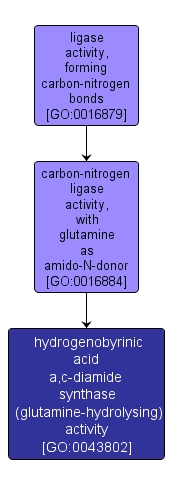GO TERM SUMMARY
|
| Name: |
hydrogenobyrinic acid a,c-diamide synthase (glutamine-hydrolysing) activity |
| Acc: |
GO:0043802 |
| Aspect: |
Molecular Function |
| Desc: |
Catalysis of the reaction: 2 ATP + hydrogenobyrinic acid + 2 L-glutamine + 2 H2O = 2 ADP + 2 phosphate + hydrogenobyrinic acid a,c-diamide + 2 L-glutamate. |
Synonyms:
- hydrogenobyrinic-acid:L-glutamine amido-ligase (AMP-forming)
- CobB
- hydrogenobyrinic acid a,c diamide synthase (glutamine-hydrolysing) activity
|
|

|
INTERACTIVE GO GRAPH
|














